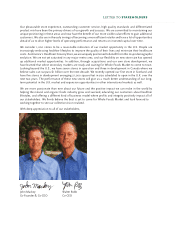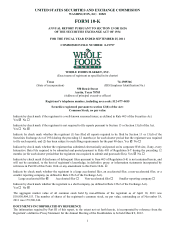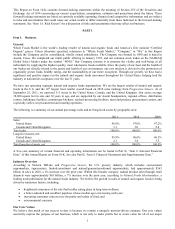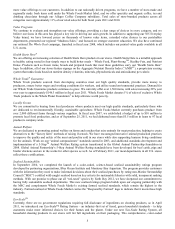Whole Foods 2011 Annual Report Download - page 16
Download and view the complete annual report
Please find page 16 of the 2011 Whole Foods annual report below. You can navigate through the pages in the report by either clicking on the pages listed below, or by using the keyword search tool below to find specific information within the annual report. 10
Social Media
Social media provides us with a powerful way to communicate and interact with our customers, giving us insight at both a
local and global level as to how we are viewed and what our customers want and expect from us. Currently, we have over
725,000 fans on Facebook and over two million followers on Twitter. In addition, many of our stores have their own
Facebook and Twitter accounts.
Global Responsibility
We seek to be a deeply responsible company in the communities where we do business around the world, providing ethically
sourced, high-quality products and transparent information to our customers, reducing our impact on the environment, and
actively participating in our local communities. We believe that many customers are concerned about health and nutrition,
food safety, fair trade and the environment, and choose to shop our stores for these reasons. Our transparency regarding
“farm-to-fork” traceability allows them to make more informed purchasing decisions and “vote” with their dollars.
Healthy Eating Education
We are providing a revolutionary educational program in our stores to promote the health of our customers and team
members. Supported by a team of renowned doctors, researchers and authors who comprise our Scientific and Medical
Advisory Board, along with nutritionists, chefs and other experts, our Health Starts Here program consists of a simple
approach to eating, paired with practical tools and valuable resources, rooted in our four principles:
• Whole Food: We believe that food in its purest state – unadulterated by artificial additives, sweeteners, colorings,
and preservatives – is the best tasting and most nutritious food available.
• Plant-StrongTM: No matter what type of diet you follow – including those with dairy, meat and seafood –
reconfigure your plate so the majority of each meal is created from an abundance of raw and cooked vegetables,
fruits, legumes and beans, nuts, seeds and whole grains.
• Healthy Fats: Get healthy fats from whole plant sources, such as nuts, seeds and avocados. These foods are rich in
micronutrients as well. Work to eliminate (or minimize) extracted oils and processed fats.
• Nutrient Dense: Choose foods that are rich in micronutrients when compared to their total caloric content. Micro-
nutrients include vitamins, minerals, antioxidants and phytochemicals. For guidance, look for the Aggregate
Nutrient Density Index (“ANDI”) scoring system in our stores.
The program includes, among other things: in-store healthy eating centers to display books and answer questions about
healthy eating and cooking ideas; store tours focused on making healthy eating choices; and a wide variety of educational
opportunities for team members, along with healthy eating classes and networking opportunities for our customers. We
believe our Health Starts Here program will grow and evolve over time to become a key competitive advantage for us, and
by offering an informed approach to food as a source for improved health and vitality, we hope to play a big part in the
solution to the healthcare crisis in America, changing many more lives for the better.
Wellness Clubs
In 2011, we piloted our new Wellness Clubs concept in four stores (www.wholefoodsmarket.com/wellnessclub). Whole
Foods Market Wellness Clubs provide an inviting environment where members are empowered to make educated and
positive lifestyle choices that promote their long-term health and well-being. The Clubs feature nutrition courses developed
by medical doctors and a dietician; inspirational and informative skills-building classes; culinary classes; Supper Clubs and
special events; coaching and support; a wellness assessment tool that keeps track of member progress; and access to a
growing local network of community businesses offering additional benefits. Members also receive a 10% discount on
thousands of designated healthy foods when they shop in stores where our Wellness Clubs are located. We are hopeful
customers will embrace this idea, resulting in the opening of additional Wellness Clubs in the future.
Whole Planet Foundation®
Created in 2005, the Whole Planet Foundation (www.wholeplanetfoundation.org) is an independent, non-profit organization
whose mission is to empower the poor through microcredit, with a focus on developing-world communities that supply our
stores with product. Microcredit is a system pioneered by Professor Muhammad Yunus, founder of the Grameen Bank in
Bangladesh and co-recipient of the 2006 Nobel Peace Prize. The philosophy behind microcredit is to provide the poor access
to credit without requiring contracts or collateral, enabling them to lift themselves out of poverty by creating or expanding
home-based businesses. Whole Foods Market covers all operating costs and the overhead budget for Whole Planet
Foundation. Program grants are funded in part by the sale of products under the Company’ s Whole Trade Guarantee
Program, along with support from customers, vendors and team members. As of September 25, 2011, the Whole Planet
Foundation has partnered with various microfinance institutions to support over $25.8 million in grants for 52 projects in 45
countries where the Company sources products. Over 161,000 borrower families (92% women) have received loans, which
are being used for home-based businesses including poultry and pig farming, agriculture, furniture making, tailoring, and
























